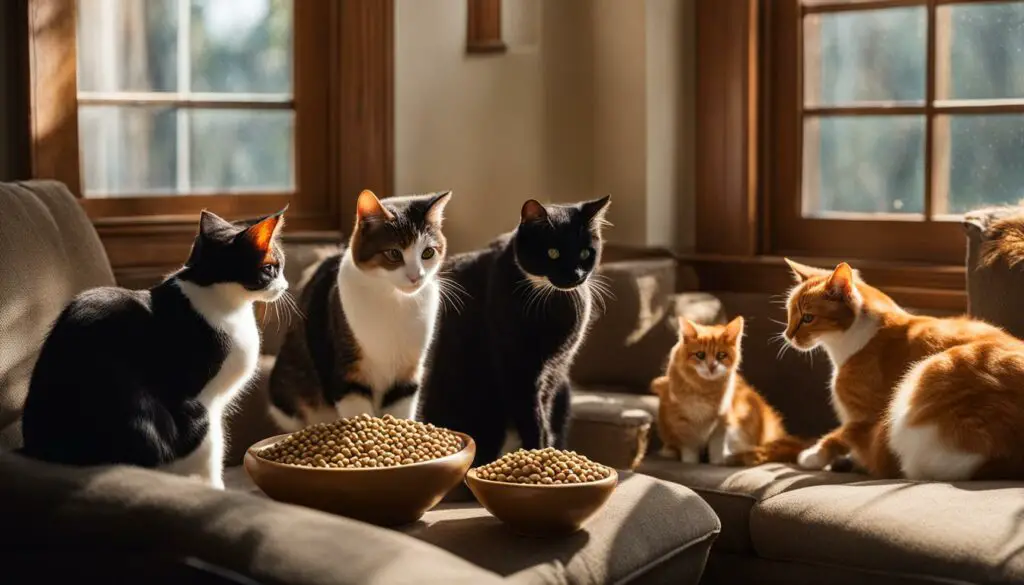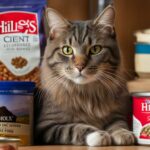As a cat owner, you may be curious about incorporating soy beans into your feline friend’s diet. While cats can eat soy beans, including edamame, it’s important to understand the role of soy in their diet and the potential risks involved.
Soy beans are safe for cats to consume in small quantities as a rare treat. Edamame, in particular, is a nutrient-dense food that can provide additional protein and minerals. However, it should not replace their regular protein-rich cat food, as cats are obligate carnivores and require animal protein sources to meet their nutritional needs.
When introducing soy beans to your cat, start with small amounts to prevent allergic reactions or digestive upset. Plain edamame, without any added ingredients or seasonings, is best. Feeding large amounts of edamame can cause digestive problems like gas, bloating, diarrhea, or constipation in cats.
In this guide, I will provide you with all the essential information you need to know about cats and soy beans. From the benefits and risks to precautions and considerations, you’ll have a comprehensive understanding of this topic.
Key Takeaways:
- Cats can eat soy beans like edamame as a rare treat, but they should not replace their regular protein-rich cat food.
- Edamame can provide additional protein and minerals, but cats are obligate carnivores and need animal protein sources to thrive.
- Start with small amounts of plain edamame when introducing it to your cat to prevent allergic reactions or digestive upset.
- Feeding large amounts of edamame can cause digestive problems in cats, such as gas, bloating, diarrhea, or constipation.
- Consult with a veterinarian for guidance on your cat’s diet and nutritional needs.
The Benefits of Edamame for Cats
Edamame, the immature soybeans, can provide some benefits to cats as a snack or treat. While it is not a necessary part of their diet, edamame offers additional protein and minerals that can support their overall health.
Edamame is a good source of protein for cats, which is essential for muscle maintenance, energy, and overall health. It also contains minerals such as magnesium, calcium, and iron, which play crucial roles in various bodily functions, including hormone regulation, healthy bone and teeth development, and muscle contraction.
However, it is important to remember that cats have unique nutritional requirements as obligate carnivores. While edamame can provide some nutritional benefits, it should not replace their protein-rich cat food that is specifically formulated to meet their dietary needs. Edamame can be given as an occasional treat but should not be a regular part of their diet.
| Benefits of Edamame for Cats |
|---|
| Additional protein for muscle maintenance and energy |
| Minerals such as magnesium, calcium, and iron for various bodily functions |
It is essential to introduce edamame gradually and in small amounts to monitor your cat’s reaction. Some cats may be sensitive or allergic to soy, and consuming a large amount of edamame can cause digestive problems such as gas, bloating, diarrhea, or constipation. If your cat tolerates edamame well, it can be an occasional treat, but always consult with your veterinarian before making any significant changes to your cat’s diet.
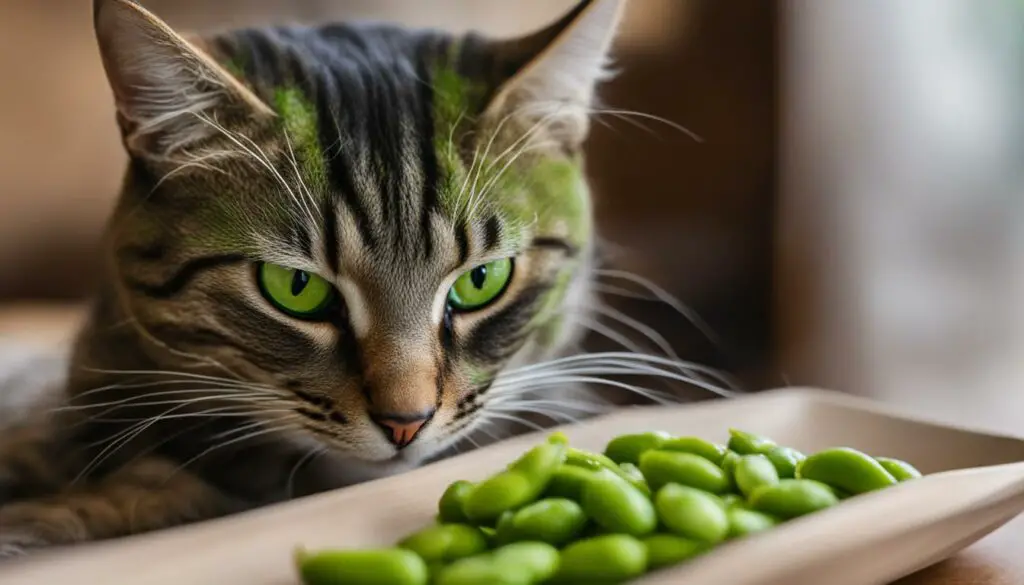
Precautions for Feeding Edamame to Cats
When it comes to feeding edamame to cats, there are a few precautions to keep in mind. While edamame is generally safe for cats, it should be introduced slowly and in small amounts to prevent any potential allergic reactions or digestive upset. Cats can sometimes have sensitivities to new foods, so it’s important to monitor their reactions closely. If your cat shows any signs of discomfort or adverse symptoms after consuming edamame, discontinue feeding it immediately and consult with a veterinarian.
Edamame should be treated as a rare treat for cats, rather than a regular part of their diet. It should never replace their essential protein-rich cat food. Feeding large amounts of edamame to cats can lead to digestive problems such as gas, bloating, diarrhea, or constipation. To ensure the health and well-being of your feline friend, it’s best to stick to plain edamame without any added ingredients or seasonings.
| Precautions for Feeding Edamame to Cats |
|---|
| Introduce edamame slowly and in small amounts |
| Monitor your cat for any allergic reactions or digestive upset |
| Discontinue feeding edamame if your cat shows any adverse symptoms |
| Edamame should be a rare treat, not a regular part of their diet |
| Avoid feeding large amounts of edamame to prevent digestive problems |
| Stick to plain edamame without any added ingredients or seasonings |
Remember, it’s always best to consult with a veterinarian before introducing any new foods to your cat’s diet. They can provide personalized advice based on your cat’s specific dietary needs and help ensure their overall health and well-being.
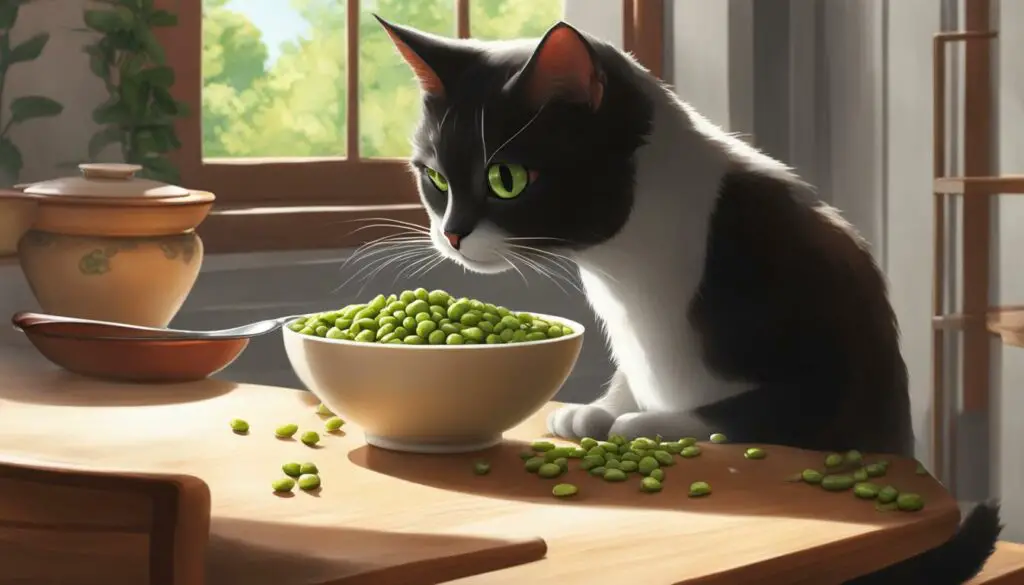
The Difference Between Edamame and Soybeans
When it comes to edamame and soybeans, there are a few key differences to consider. Edamame is simply soybeans that haven’t ripened yet. These young soybeans are typically green and sold in pods. On the other hand, soybeans are mature soybeans that have a tan or light brown color.
While both edamame and soybeans come from the same plant, their uses and nutritional profiles can vary. Edamame is often consumed as a snack or added to dishes in East Asian cuisine. It is known for its high protein content and is a good source of minerals such as magnesium, calcium, and iron.
When it comes to feeding cats, it is important to note that while edamame is safe for cats in small quantities, raw soybeans should be avoided. Raw soybeans can contain bacteria and toxins that may cause gastrointestinal complications for cats. If you choose to incorporate soybeans into your cat’s diet, it is best to opt for commercial cat food that has undergone extensive processing for digestibility.
| Edamame | Soybeans |
|---|---|
| Young soybeans | Mature soybeans |
| Green in color | Tan or light brown in color |
| Used in East Asian cuisine | Used for various purposes, including in cat food |
| High in protein and minerals | May require processing for digestibility |
In conclusion, while edamame can offer some nutritional benefits for cats, such as additional protein and minerals, it is important to feed it in moderation. Raw soybeans should be avoided due to their potential risks, and it is best to opt for commercially processed soybeans in cat food if you choose to incorporate them into your cat’s diet.
Can Cats Eat Other Types of Beans?
Cats can eat some types of beans in moderation, but it is important to note that cats are obligate carnivores and have specific nutritional requirements that are best met through animal protein sources. Beans can provide additional fiber and protein to a cat’s diet, but they should not replace their protein-rich cat food. Some cats may be sensitive or allergic to certain beans, so it is important to monitor for any adverse reactions. It is always best to consult with a veterinarian before introducing new foods to a cat’s diet.
When it comes to legumes, such as beans, cats can safely consume small amounts of certain varieties. However, it is important to avoid beans that are toxic to cats, such as raw kidney beans, as they contain lectins that can cause severe gastrointestinal upset. Safe options for cats include cooked black beans, pinto beans, and chickpeas, which can be mashed or pureed to ensure easy digestion. These legumes can provide some additional protein and fiber to a cat’s diet, but they should only be given as an occasional treat and not as a replacement for their regular cat food.
| Types of Beans | Safety for Cats | Benefits |
|---|---|---|
| Black Beans | Safe in small amounts | Source of protein and fiber |
| Pinto Beans | Safe in small amounts | Source of protein and fiber |
| Chickpeas | Safe in small amounts | Source of protein and fiber |
When introducing beans to a cat’s diet, it is important to start with small amounts and observe for any adverse reactions such as gastrointestinal upset or allergy symptoms. If the beans are well tolerated, they can be given as an occasional treat. However, it is important to remember that beans should not replace a cat’s regular diet of protein-rich cat food. Consulting with a veterinarian is always recommended to ensure that any additions to a cat’s diet are safe and appropriate.
The Importance of a Balanced Cat Diet
When it comes to cat nutrition, a balanced diet is key to ensuring your furry friend’s overall health and well-being. Cats have specific dietary needs as obligate carnivores, meaning they require animal protein sources to thrive. Protein plays a crucial role in muscle maintenance, energy production, and the health of their skin and coat. Therefore, it’s important to provide your cat with a diet that includes an adequate amount of protein.
In addition to protein, cats also require other essential nutrients such as vitamins, minerals, and fatty acids. These nutrients support various bodily functions including immune system function, bone and teeth development, and overall organ health. A well-balanced cat diet should incorporate these essential nutrients to support your cat’s overall health.
It’s important to note that commercial cat food is specially formulated to meet the specific nutritional needs of cats. High-quality cat food contains real meat as the primary ingredient and provides a balanced combination of protein, vitamins, minerals, and fatty acids. By feeding your cat a nutritionally balanced commercial diet, you can ensure that they are receiving the necessary nutrients to thrive.
While occasional treats like edamame can be given, they should not replace the balanced nutrition provided by commercial cat food. Consult with your veterinarian to determine the best diet plan for your cat and to address any specific dietary concerns or questions you may have.
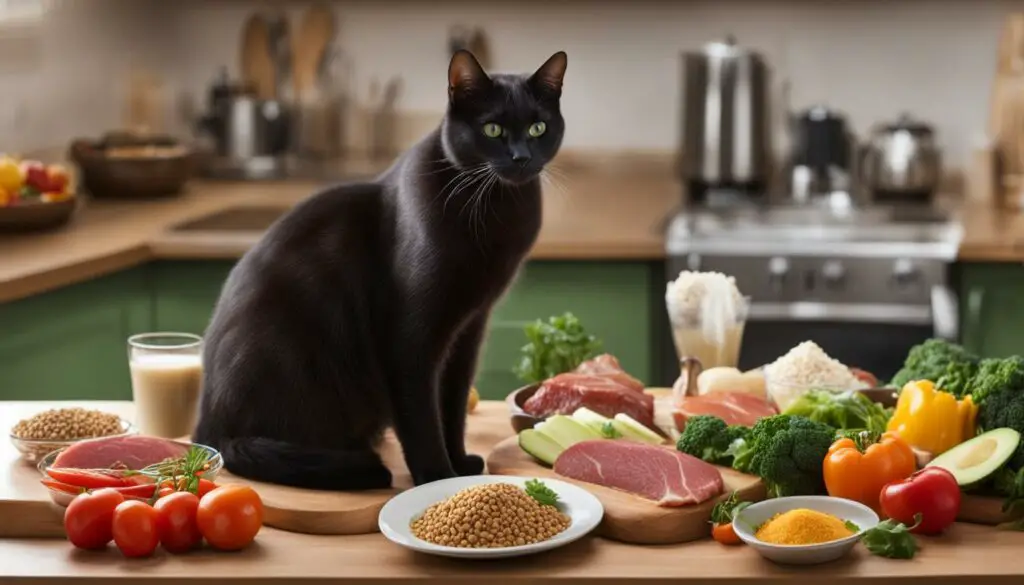
Table: Essential Nutrients for Cats
| Nutrient | Function | Sources |
|---|---|---|
| Protein | Muscle maintenance, energy production, skin and coat health | Meat, fish, poultry |
| Vitamins | Various functions including immune system support, organ health, and enzyme function | Fruits, vegetables, organ meats |
| Minerals | Bone and teeth development, fluid regulation, enzyme function | Meat, fish, dairy products, fruits, vegetables |
| Fatty Acids | Healthy skin and coat, brain health | Fish oil, poultry fat, flaxseed oil |
By providing your cat with a balanced diet that meets their nutritional needs, you can help ensure their overall health and well-being. Remember to consult with your veterinarian for personalized dietary recommendations and to address any specific concerns you may have regarding your cat’s nutrition.
Potential Risks of Soy Allergies in Cats
While soy allergies are rare in cats, it is important to be aware of the potential risks associated with soy consumption. Some cats may be sensitive or allergic to soy, and this can lead to various symptoms and complications. If your cat exhibits any of the following symptoms after consuming soy or soy-based products, it is essential to discontinue feeding them and consult with a veterinarian:
- Gastrointestinal upset
- Skin irritation
- Itching
- Respiratory issues
Soy allergies in cats can cause discomfort and affect their overall well-being. It is important to pay attention to any allergic reactions and take appropriate action to prevent further complications.
I cannot provide specific medical advice or diagnosis, so it is always best to consult with a veterinarian for professional guidance if you suspect that your cat may have a soy allergy or is experiencing any related symptoms.
Table: Common Symptoms of Soy Allergies in Cats
| Symptoms | Description |
|---|---|
| Gastrointestinal upset | Includes vomiting, diarrhea, or constipation |
| Skin irritation | May manifest as redness, rash, or itching |
| Itching | Excessive scratching or rubbing of the body |
| Respiratory issues | Difficulty breathing, wheezing, or coughing |
Remember, if you notice any of these symptoms in your cat after consuming soy or soy-based products, it is crucial to seek veterinary assistance to ensure your cat’s health and well-being.
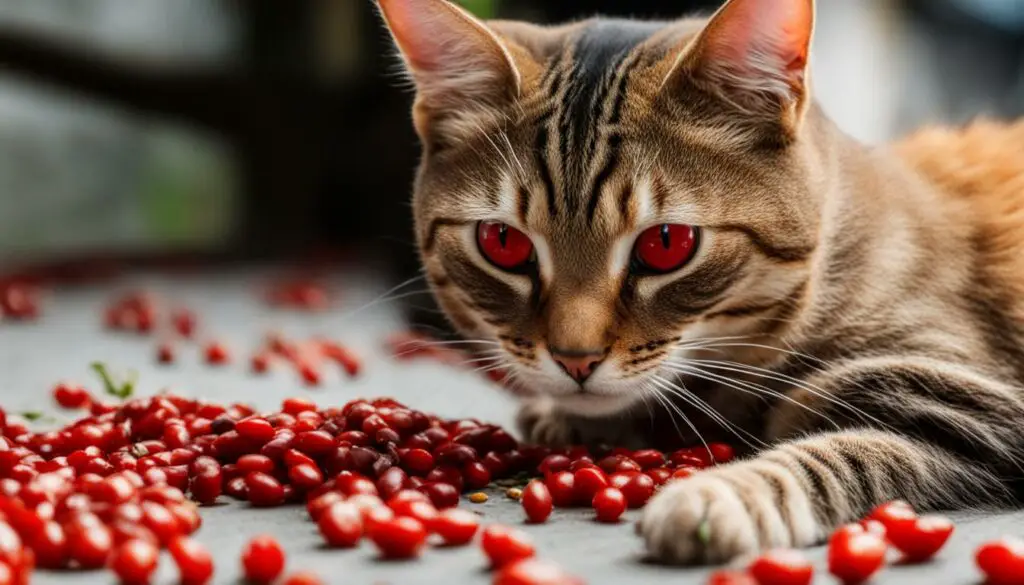
Cat Nutrition and Plant-Based Diets
When it comes to cat nutrition, it is important to consider the unique dietary needs of cats as obligate carnivores. While plant-based diets, such as vegan or vegetarian diets, have gained popularity among humans, they are not suitable for cats. Cats require animal protein sources to meet their nutritional needs, as they are biologically designed to derive essential nutrients from meat.
Feeding cats a plant-based diet can lead to nutrient deficiencies and health issues. Cats require specific amino acids, such as taurine, which are found only in animal tissues. A deficiency in taurine, as well as other essential nutrients, can have serious consequences for a cat’s health, including heart disease, vision problems, and immune system dysfunction.
Plant-based cat foods, also known as vegan or vegetarian cat foods, attempt to mimic the nutritional content of meat-based cat foods through the use of plant-based protein sources. However, these foods often require extensive supplementation to meet a cat’s nutritional needs. It is important to consult with a veterinarian before considering a plant-based diet for your cat, as they can provide guidance on the most appropriate nutritional plan for your feline friend.
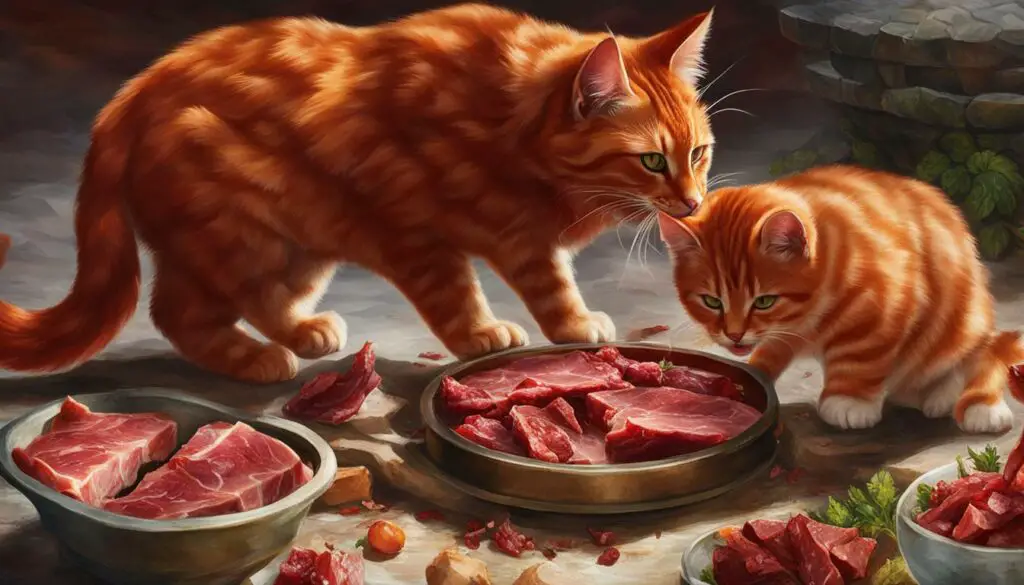
“Cats are obligate carnivores and require animal protein sources to meet their nutritional needs.”
Understanding Cat Nutrition Needs
When it comes to cat nutrition, it is essential to prioritize animal protein sources. Cats require high-quality protein to support muscle maintenance, energy production, and overall health. Meat-based cat foods provide a complete and balanced source of essential amino acids that cats need to thrive. These foods are formulated to meet the specific nutritional requirements of cats at different life stages, such as kittens, adults, and seniors.
While occasional treats or small amounts of plant-based foods like edamame can be given to cats, they should not replace the animal protein provided by their regular cat food. Always consult with a veterinarian for personalized guidance on your cat’s nutrition to ensure that they are receiving a balanced diet that meets their individual needs.
| Plant-Based Diets for Cats | Animal Protein for Cats |
|---|---|
| May lead to nutrient deficiencies | Provides essential amino acids and nutrients |
| Can cause health issues | Supports muscle maintenance and overall health |
| Require extensive supplementation | Naturally provides necessary nutrients |
“Meat-based cat foods provide a complete and balanced source of essential amino acids that cats need to thrive.”
In conclusion, cats are obligate carnivores and require animal protein sources to meet their nutritional needs. Plant-based diets, such as vegan or vegetarian diets, are not recommended for cats as they may lead to nutrient deficiencies and health issues. It is important to provide high-quality meat-based cat food that is specifically formulated to meet a cat’s nutritional requirements. While occasional treats like edamame can be given, they should not replace the balanced nutrition provided by commercial cat food. Consult with a veterinarian for personalized guidance on your cat’s diet and nutrition to ensure their health and well-being.
Soybeans in Commercial Cat Food
Soybeans are commonly used in commercial cat food as a source of protein. However, it is important to note that the soy used in cat food undergoes extensive processing for better digestibility. Raw soybeans can be difficult for cats to digest and may not provide the same nutritional benefits as processed soy. The use of soybeans in cat food is based on their protein content and the fact that they do not contain the common allergens found in other protein sources, such as chicken or beef.
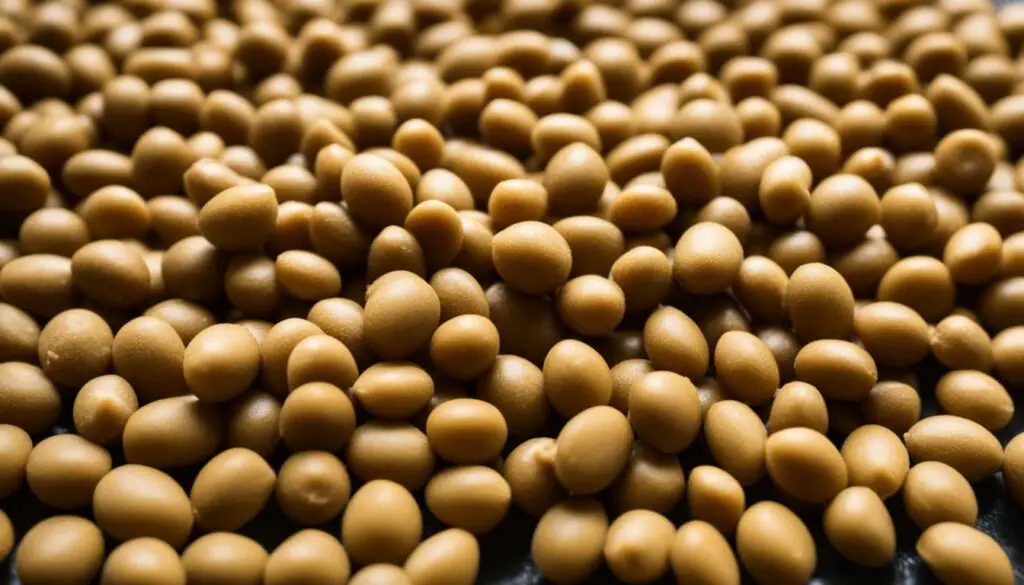
While soybeans can be a valuable source of protein in cat food, it is essential to consider your cat’s individual needs and any dietary restrictions or allergies they may have. Additionally, it is important to ensure that soy is not the main or sole source of protein in your cat’s diet. Cats require a balanced diet that includes high-quality animal protein sources to meet their unique nutritional requirements as obligate carnivores.
When choosing a commercial cat food, it is always recommended to carefully read the ingredients list and consult with a veterinarian. They can guide you in selecting a cat food that meets your cat’s specific nutritional needs, taking into consideration their age, health condition, and any dietary restrictions. Veterinarians can provide tailored advice and recommendations to ensure your cat’s diet is balanced and promotes optimal health.
Introducing Soy Beans to Cats
If you’re considering introducing soy beans to your cat’s diet, it’s important to do so cautiously and in moderation. Soy beans can be given as a rare treat, but they should not replace the protein-rich cat food that meets your cat’s nutritional needs. Here are some tips to keep in mind when feeding soy beans to your cat:
- Start with small amounts: Begin by offering your cat a few soy beans and monitor their reaction. Look for any signs of allergies or digestive upset, such as vomiting or diarrhea. If your cat tolerates the soy beans well, you can gradually increase the portion size.
- Plain soy beans only: When feeding soy beans to your cat, make sure they are plain and free from any seasonings or added ingredients. Cats have sensitive digestive systems, and added flavors or spices can cause stomach upset.
- Consider soy beans as treats: Soy beans should be seen as an occasional treat, not a staple in your cat’s diet. Remember that cats are obligate carnivores and require animal protein sources to meet their nutritional needs. Soy beans can provide some additional protein, but they should not replace the balanced nutrition provided by commercial cat food.
As with any new food, it’s always best to consult with a veterinarian before introducing soy beans to your cat’s diet. They can provide personalized guidance based on your cat’s specific nutritional needs and health conditions. By following these tips and monitoring your cat’s response, you can safely introduce soy beans as a rare treat for your feline companion.
Table: Pros and Cons of Feeding Soy Beans to Cats
| Pros | Cons |
|---|---|
| Provides additional protein | Soy beans should not replace animal protein sources |
| Contains minerals such as magnesium and iron | Potential for allergies or digestive upset |
| Can be given as a rare treat | Should be plain and free from added ingredients |
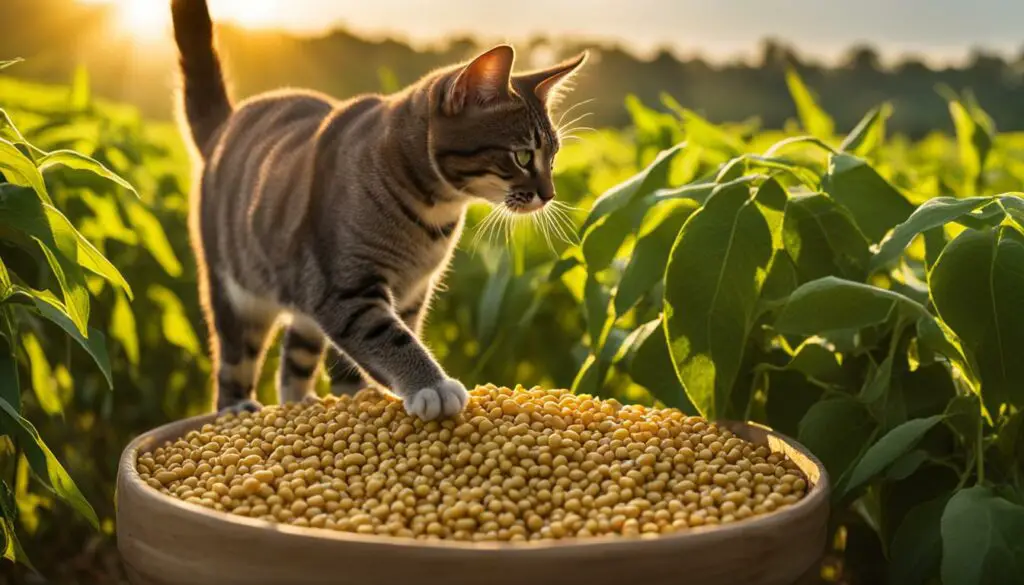
Other Considerations for Cat Nutrition
When it comes to cat nutrition, there are several important considerations to keep in mind. Ensuring that your cat’s diet meets their specific nutritional needs is crucial for their overall health and well-being. Here are some key factors to consider:
1. Cat Food Quality
Choosing a high-quality cat food is essential for providing your cat with the necessary nutrients. Look for cat foods that contain real meat as the first ingredient and do not contain unnecessary fillers or artificial additives. Reading the labels and understanding the ingredients can help you make informed decisions about the quality of the cat food you are feeding your cat.
2. Reading Cat Food Labels
Reading cat food labels can give you valuable insight into the nutritional composition of the food. Look for foods that meet the Association of American Feed Control Officials (AAFCO) guidelines for complete and balanced nutrition. Understanding the guaranteed analysis and ingredient list can help you ensure that your cat’s dietary requirements are being met.
3. Cat Food Types
There are different types of cat food available, including wet and dry options. Wet cat food has a higher moisture content and can help promote hydration in cats. Dry cat food is convenient and can be left out for longer periods. Both options have their pros and cons, and the choice ultimately depends on your cat’s preferences and specific needs.
4. Cat Food for Different Life Stages
Cats have different nutritional needs at different stages of life. Kittens require more protein and calories to support their growth and development, while senior cats may benefit from cat food formulated to support joint health and overall wellness. Choosing cat food appropriate for your cat’s life stage can help ensure they are receiving the right nutrients at each stage of their life.
By taking these considerations into account, you can provide your cat with a balanced diet that meets their nutritional needs. It is always recommended to consult with a veterinarian for personalized advice and recommendations based on your cat’s individual needs and health conditions.
Ensuring a Balanced Cat Diet
When it comes to our feline friends, ensuring a balanced diet is crucial in meeting their nutritional needs. A balanced diet for cats consists of providing them with high-quality commercial cat food that contains the necessary animal protein and essential nutrients. But how do we ensure that our cats are getting the right nutrients?
One important step is to follow the cat food recommendations and guidelines provided by the cat food manufacturer. These guidelines are based on extensive research and are designed to provide cats with the right balance of nutrients. It is important to feed your cat the recommended amount of food based on their age, size, and activity level.
Consulting with a veterinarian is also key in maintaining a balanced cat diet. Veterinarians have the knowledge and expertise to evaluate your cat’s individual nutritional needs and can provide specific recommendations for their diet. They can also help address any dietary concerns or issues that may arise, ensuring that your cat is getting the best possible nutrition.
Meeting Cat Nutritional Needs
Cats have specific nutritional requirements that need to be met in order for them to thrive. They are obligate carnivores, which means they require animal protein sources to meet their dietary needs. Animal protein provides essential amino acids that cats cannot produce on their own. It is important to choose a cat food that lists real meat as the first ingredient, ensuring that your cat is getting the protein they need.
In addition to protein, a balanced cat diet should also include other essential nutrients such as vitamins, minerals, and fatty acids. These nutrients play a vital role in supporting overall health, including skin and coat health, immune function, and proper organ function. Choosing a high-quality cat food that is formulated to meet these specific nutritional needs is crucial.
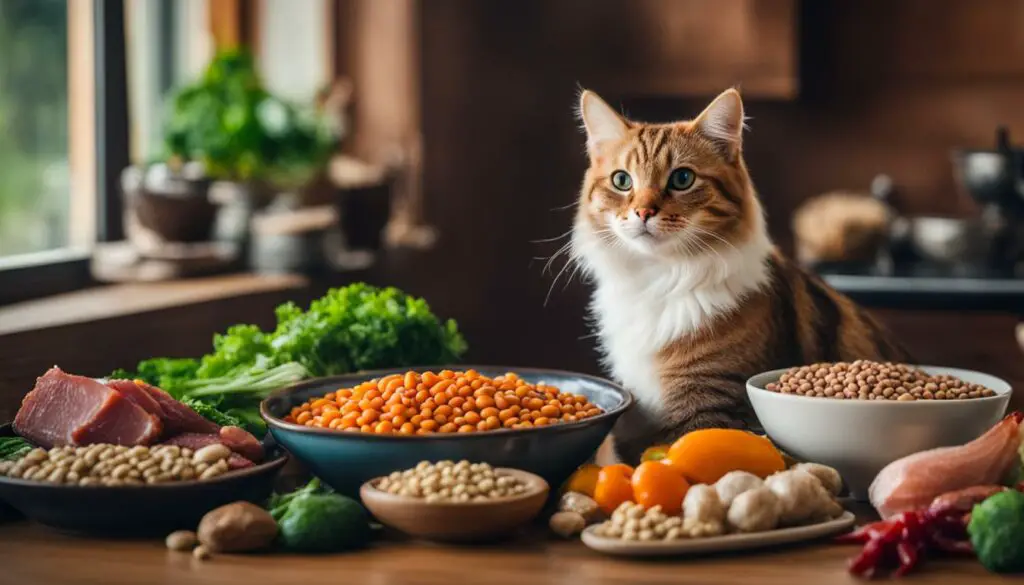
| Nutrient | Importance | Sources |
|---|---|---|
| Protein | Building blocks for muscle maintenance, energy, and immunity | Real meat, poultry, fish |
| Vitamins and Minerals | Essential for overall health and organ function | Fruits, vegetables, grains |
| Fatty Acids | Supports healthy skin and coat, brain function, and inflammation control | Fish oil, flaxseed oil |
By providing your cat with a balanced diet that meets their nutritional needs, you are ensuring that they have the best chance at a long and healthy life. Regular veterinary check-ups and consultations with a veterinarian can help monitor your cat’s overall health and make any necessary adjustments to their diet.
Veterinarian-Approved Cat Diet: A Guide to Optimal Nutrition
When it comes to ensuring your cat’s health and well-being, a veterinarian-approved diet is essential. A veterinarian can provide you with expert recommendations and guidance tailored to your cat’s specific needs and health conditions. By consulting with a veterinarian, you can create a cat diet plan that ensures your furry friend receives the optimal nutrition they require to thrive.
During a cat nutrition consultation, a veterinarian will consider various factors including your cat’s age, activity level, and any existing health conditions. They will take into account your cat’s individual dietary needs, such as protein requirements and nutrient balance. Based on this information, the veterinarian can recommend appropriate cat food options that meet these specific needs.
By following a veterinarian-approved cat diet, you can rest assured that your cat is receiving the essential nutrients they need for proper growth, development, and overall health. A balanced and nutritious cat diet can support your cat’s immune system, maintain a healthy weight, promote strong bones and teeth, and improve their overall quality of life.
Remember, regular consultations with a veterinarian for cat nutrition are crucial for monitoring your cat’s dietary needs and making any necessary adjustments. By working closely with a veterinarian, you can provide your cat with the best possible diet for optimal health and well-being.

Table: Essential Considerations for a Veterinarian-Approved Cat Diet
| Factor | Key Considerations |
|---|---|
| Life Stage | Choose cat food appropriate for kittens, adult cats, or seniors to meet their specific nutritional needs at each stage of life. |
| Protein Source | Ensure the cat food contains high-quality animal protein as the main ingredient to meet a cat’s obligate carnivore dietary requirements. |
| Essential Nutrients | Check that the cat food includes essential nutrients such as vitamins, minerals, and fatty acids to support overall health and well-being. |
| No Artificial Additives | Avoid cat food that contains artificial additives, fillers, or unnecessary ingredients that may compromise nutritional value. |
| Dietary Restrictions | If your cat has any dietary restrictions or allergies, consult with a veterinarian to ensure their specific needs are met. |
Conclusion
In conclusion, cats can safely eat soy beans, including edamame, as a rare treat. Soy beans are generally safe for cats, but they should not be a regular part of their diet. While edamame can provide additional protein and minerals, cats are obligate carnivores and need animal protein sources to meet their specific nutritional requirements.
Feeding large amounts of edamame or relying on soybeans as a replacement for cat food can lead to digestive problems and nutrient imbalances. It’s important to remember that cats should primarily be fed a balanced cat food that provides the necessary animal protein and essential nutrients they need to thrive.
If you choose to introduce soy beans to your cat’s diet, start with small amounts and monitor for any adverse reactions. Always consult with a veterinarian for guidance on your cat’s diet and nutritional needs. They can provide you with specific recommendations and help create a cat diet plan that ensures your furry friend’s overall health and well-being.
So, while cats can enjoy the occasional soy bean treat, it’s best to prioritize their protein-rich cat food and consult with a veterinarian for expert advice on providing them with a balanced and nutritious diet.
FAQ
Can cats eat soy beans?
Cats can eat soy beans, including edamame, in small quantities as a rare treat.
Are soy beans safe for cats?
Yes, soy beans are safe for cats, but they should not be a regular part of their diet.
What are the benefits of edamame for cats?
Edamame is a nutrient-dense food that offers cats additional protein and minerals.
Can edamame replace a cat’s protein-rich cat food?
No, the extra protein in edamame should not replace their protein-rich cat food.
How should edamame be given to cats?
Edamame should be given plain, without seasonings or added ingredients.
What are the potential risks of feeding edamame to cats?
Feeding large amounts of edamame can cause digestive problems in cats, such as gas, bloating, diarrhea, or constipation.
What is the difference between edamame and soybeans?
Edamame is simply soybeans that haven’t ripened yet. They are typically green and sold in pods, while soybeans are mature and have a tan or light brown color.
Can cats eat other types of beans?
Cats can eat some types of beans in moderation, but they should not replace their protein-rich cat food.
Are cats allergic to soy?
While soy allergies are rare in cats, some cats may be sensitive or allergic to soy.
Can cats thrive on a plant-based diet?
No, cats are obligate carnivores and require animal protein sources to meet their nutritional needs.
Are soybeans used in commercial cat food?
Soybeans may be used in some commercial cat foods as a source of protein.
How can soy beans be introduced to cats?
It is important to start with small amounts and monitor for any adverse reactions.
What should be considered for cat nutrition?
A balanced diet that meets a cat’s specific nutritional needs is essential for their overall health and well-being.
Are there potential risks of soy allergies in cats?
Yes, cats can have soy allergies which may cause gastrointestinal upset, skin irritation, itching, and respiratory issues.
Can cats thrive on a plant-based diet?
No, cats are obligate carnivores and require animal protein sources to meet their nutritional needs.
Are soybeans used in commercial cat food?
Yes, soybeans may be used in some commercial cat foods as a source of protein.
How can soy beans be introduced to cats?
It is important to start with small amounts and monitor for any adverse reactions.
What should be considered for cat nutrition?
A balanced diet that meets a cat’s specific nutritional needs is essential for their overall health and well-being.
How can I ensure a balanced diet for my cat?
It is important to feed them a high-quality commercial cat food that provides the necessary animal protein and essential nutrients, and to consult with a veterinarian for recommendations and guidance.
Source Links
- https://excitedcats.com/can-cats-eat-edamame/
- https://www.hepper.com/can-cats-eat-edamame/
- https://waldosfriends.org/blog/can-cats-eat-soybeans

